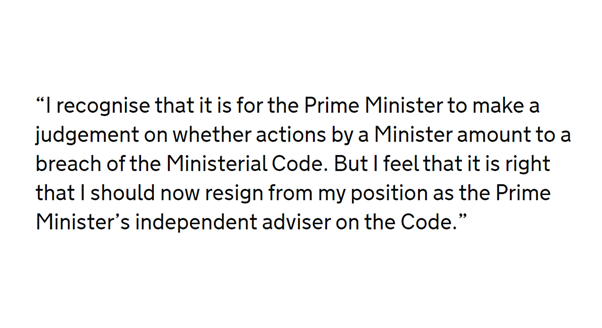2-minute read
Dermot Feenan
LLB MA LLM Barrister-at-Law FRSA
.
Boris Johnson’s decision today to not sanction Priti Patel, UK Home Secretary, for bullying represents a new low for the Conservative Prime Minister, his Cabinet, and their sense of ministerial accountability – including respect for principles of public life.
Sir Alex Allan, the Independent Adviser tasked with investigating complaints against the Home Secretary, concluded that ‘her behaviour has been in breach of the Ministerial Code’.
Yet, the Prime Minister stated that ‘the Ministerial Code was not breached’. It is impossible to reconcile the statement by Boris Johnson with the finding by Sir Alex. It is unsurprising that Sir Alex resigned.
In his resignation statement, Sir Alex said that he recognised it is for the Prime Minister ‘to make a judgement on whether actions by a Minister amount to a breach of the Ministerial Code.’
He added, ‘I feel that it is right that I should now resign from my position as the Prime Minister’s independent adviser on the Code.’

The Ministerial Code is unambiguous. It states: ‘Harassing, bullying or other inappropriate or discriminating behaviour wherever it takes place is not consistent with the Ministerial Code and will not be tolerated.’
The lack of sanction against Priti Patel damages government. It undermines confidence in the current government. It harms the Civil Service.
The lack of accountability for the Home Secretary’s conduct has already damaged retention of Civil Service staff, as the resignation in February 2020 of Sir Philip Rutnam, then Permanent Secretary at the Home Office, shows.
Upon resigning, Sir Philip referred to the Home Secretary’s conduct towards him as part of ‘a wider pattern of behaviour’ which included allegations of ‘shouting, swearing, belittling people, making unreasonable and repeated demands; behaviour that created fear.’
Sir Philip has initiated a claim for constructive dismissal and whistleblowing against the Home Office, which is due to be heard by an Employment Tribunal.
Sir Alex Allan’s resignation also illustrates such damage. He was a senior civil servant, formerly chair of the Joint Intelligence Committee and, unusually, private secretary to two consecutive Prime Ministers: John Major and Tony Blair.
The lack of accountability towards Patel for her bullying potentially adversely affects recruitment to the Civil Service. Who wants to work for a government which fails to hold to account bullying behaviour?
This is in addition to concerns about Johnson’s judgement. Johnson stated in his Foreword to the Ministerial Code: ‘There must be no bullying’. He added: ‘The time has come to act, to take decisions, and to give strong leadership to change this country for the better. That is what this Government will do.’
Not only has Johnson failed to follow the Code and his own insistence that there must be no bullying, but by linking that insistence to his own leadership, he has displayed failure to lead. This reinforces growing concerns about his competence as PM.
It is significant that in the Foreword to the 2018 Code, then PM Theresa May stated: “We need to establish a new culture of respect at the centre of our public life: one in which everyone can feel confident that they are working in a safe and secure environment.”
The references to working in a safe and secure environment are absent from Johnson’s Foreword. It is troubling that Johnson has previously been found to have breached the Code, renewing wider concerns that the procedure for ministerial accountability requires reform.
Johnson’s decision further undermines confidence in the government’s adherence to law and policy, especially in view of its admission it will break international law and its failure to sanction adviser Dominic Cummings for trips during the first coronavirus restrictions.
.
©Dermot Feenan 2020